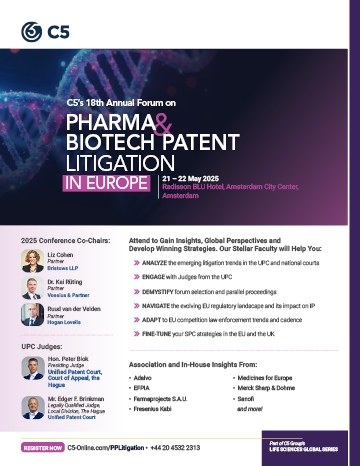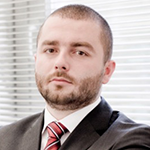2025 Agenda

Flip through our conference brochure and discover what’s new this year.
Download Brochure
Day 1
May 21, 2025
Registration and Breakfast
C5's UPC Institute

Dr. Sönke HoltorfDirector, BiotechnologyEuropean Patent Office

Dr. Eva EhlichPartnerMaiwald Intellectual Property

Dr. Ian JonesEuropean Patent Attorney | UPC RepresentativeGill Jennings & Every LLP
In this panel, speakers will analyze the guiding principles set by the Enlarged Board for using post-published evidence in inventive step assessment in the G2/21 decision and subsequent cases that have applied the principles. Topics of discussion will include:
- Reconciling the EPO’s application with national courts and navigating inconsistent applications
- Differentiating between the EPO approach and that used by the UPC
- Detailing the impact of these decisions on determining inventive step and devising strategies for effectively incorporating post-published evidence in light of national, UPC and EPO decisions

Simona Levi, Ph.D.Chief Legal OfficerVIZGEN

Dr. Moritz SchroederPartnerBird & Bird

Dr. Tobias WuttkeEquity PartnerBARDEHLE PAGENBERG

Anita VarmaPartnerWhite & Case LLP
In this panel, speakers will analyze the developing caselaw for preliminary injunctions at the UPC. Topics of discussion include:
- Examining the guiding principles that are used in the assessment of provisional measures
- Establishing “sufficient certainty” that the patent in suit is valid and infringed
- Analyzing the role of expert opinions in PI proceedings
- Comprehending the standard for “Imminent infringement” (in the biosimilar preliminary injunction case between Novartis and Celltrion)
- Interpreting the standard of “urgency” throughout the Local Divisions and the CoA
- In which cases is a preliminary injunction “necessary”?
- Understanding whether enforcement securities are a necessary balance in the UPC PI system
- Identifying the prerequisites for re-opening a UPC preliminary injunction case
- E.g., in the diagnostic device case between NanoString and 10x Genomics
Networking Break

Honorable Edger BrinkmanPresiding JudgeUPC LD the Hague, the Netherlands
Senior Judge
Court of the Hague, the Netherlands

Honorable Peter BlokJudgeUPC, Court of Appeal, Luxembourg

Professor Willem HoyngManaging PartnerHoyng Rokh Monegier
G1/24 Referral on Claim Interpretation When Assessing Patentability: Resolving Disharmony in EPO and UPC Case Law?

Emma DemetriadesPartnerCarpmaels & Ransford LLP

Sabrina DuschnerVP Patent Litigation StrategyFresenius Kabi

Dr Rose HughesPatent Attorney & IP StrategistEvolve

Markus RieckPartnerFuchs Patentanwälte Partnerschaft mbB
The EPO Enlarged Board of Appeal has heard oral arguments on a critical question: whether or not, and to what extent, the claims of a European patent can be interpreted using the description and figures. Settling the disharmony of EPO case law, and harmonizing the EPO and UPC’s approach, will provide important guidance on how to interpret the validity of the patent and the scope of protection provided by the patent. Topics of discussion include:
- Identifying the key cases that led to the divergence in EPO case law with reference to Articles 69 and 84 EPC
- E.g., the approach used in T 0169/20, T 0223/05, T 1924/20 versus the approach used in T 556/02, T 1473/19, and the ongoing proceedings in T 439/22 (where the Board referred the claim interpretation questions to the Enlarged Board of Appeal)
- Identifying the UPC’s approach to claim interpretation at first instance and at the Court of Appeal
- E.g., the first instance infringement action filed by 10x Genomics against NanoString; NanoString’s subsequent appeal (CoA decision UPC_CoA_335/2023); and NanoString’s parallel EPO opposition proceedings
- Analyzing the submissions of the amicus curiae briefs
- Summarizing the oral arguments in the referral (oral proceedings heard in March 2025)
Networking Luncheon
Advancements in Antibody Patent Prosecution: Distilling Strategies for Future Success from the UPC, EU and US Case Law

Pamela TuxworthPartner | European & UK Patent AttorneyJ A Kemp

Dr. Jörk ZwickerPartnerZwicker Schnappauf & Partner

Ruud van der VeldenPartnerHogan Lovells
This session addresses the continually evolving landscape of antibody patenting in Europe and the U.S., incorporating crucial case law developments from 2024 into effective prosecution strategies for 2025. Session leaders will dissect recent influential decisions and explore their implications for drafting and litigating antibody patents in different jurisdictions.
Topics of discussion will include:
- Adopting effective strategies for claiming antibodies, considering different patent office interpretations and how to draft claims that secure protection across jurisdictions
- Examining how recent EPO decisions, like T 0499/18, and the UPC Central Division’s revocation of Amgen’s patent, influence the acceptability of claims where a combination of antigen plus function is used to define an antibody
- Contrasting the U.S. Supreme Court’s decision, which deemed claims of two Amgen patents invalid due to insufficient enablement for a genus of antibodies, with UPC caselaw
- Understanding the nuances of epitope-based claims, functional antibody claims, combination therapies, companion diagnostics
Demystifying Forum Selection and Parallel Proceedings: Developing Strategic Litigation Pathways at the UPC and Beyond

Liz CohenPartnerBristows LLP

Oscar LammePartner | UPC RepresentativeSimmons & Simmons Netherlands

Dr. Kai Rüting, LL.M.Partner | UPC RepresentativeVossius & Partner
- Deciphering which substantive law applies at the UPC
- E.g., what are the tendencies of the UPC’s Local Divisions in applying EPO and national law?
- Distilling the factors for selecting the Local Division versus other venue
- Analyzing the role and use of experts in infringement and invalidity proceedings at the UPC
- Analyzing the evolving relationship between EPO opposition proceedings and validity challenges within the UPC
- Assessing how decisions in one forum influence strategies and outcomes in the other and navigating parallel proceedings
- Assessing if the UPC is a pharma-friendly venue through an analysis of the first decisions
- Contrasting the UPC with the U.S., the UK, the Netherlands and Germany
Networking Break
Updated Strategies for Defending and Enforcing Patent Rights in Non-UPC Jurisdictions: Spotlight on Brazil and China

Eduardo HallakFounding PartnerLicks Attorneys

Huiya WuPartnerGoodwin Procter LLP
- Analyzing the impact of UPC developments on non-member states and how these jurisdictions are responding to the changing European patent landscape
- Exploring the specific challenges and opportunities in Brazil and China, highlighting their unique patent environment and implications for global patent strategies
- Identifying the key considerations for enforcing patents in non-UPC jurisdictions
- Developing defense strategies and tactics for patent litigation in these jurisdictions
Developments in EU Competition Law Affecting Pharmaceutical Patents: Preparing for New Enforcement Trends and Economic Impacts

Boris AndrejašCase HandlerEuropean Commission
DG Comp

Ingrid VandenborrePartner | Co-head Antitrust/Competition PracticeSkadden, Arps, Slate, Meagher & Flom LLP

Brigitte Carion-TaravellaEuropean Patent AttorneySanofi
In January 2024, the EC published a report providing an overview of the enforcement of EU antitrust and merger rules between 2018 and 2022. Then in October 2024, the EC fined Teva 462.6 million euros for allegedly abusing its dominant position to delay competition to its blockbuster multiple sclerosis pharmaceutical, Copaxone. The ruling, which Teva is appealing, and the EC’s enforcement report, provide valuable insights into the enforcement cadence of Europe’s antitrust authorities and raises important questions as to the boundary between legitimate and illegal means of competition in the pharmaceutical sector.
- Reviewing the core principles and past cases that have interpreted “abuse of dominant position” under Article 102 of the Treaty on the Functioning of European Union and “misuse” of the patent system
- E.g., the January 2024 report published by the EC
- Analysing the facts of the Teva case and identifying the two practices the EC considered as delaying competition
- Unpacking the EC’s finding that Teva “artificially” extended its patent protection for Copaxone through playing “the divisionals game”
- Dissecting the EC’s finding that Teva engaged in exclusionary disparagement of a competing glatiramer acetate
- Crafting divisional strategies aligned with today’s competition law and anti-trust climate
Networking Cocktail
Conference Adjourns to Day Two
Day 2
May 22, 2025
Registration and Breakfast
Changes to IP Regulatory Rights Flowing from the EU Pharmaceutical Law and Regulation Reforms: Key Takeaways for Industry

Sergio NapolitanoGeneral Counsel and External Relations DirectorMedicines for Europe

Michael SwitaDirector of IP PolicyEuropean Federation of Pharmaceutical Industries and Associations (EFPIA)

Mike Gruber, LL.M. IP.Partner | UPC RepresentativeHoffmann Eitle
The proposed legislation includes several regulatory updates that are critical to the work of litigators and patent attorneys as they directly impact life cycle management of valuable biopharma patents. The following changes from the proposed legislation and regulation will be highlighted, and their impact on life cycle management explored:
Orphan Market Exclusivity (OME)
- Unpacking the Commission’s new concept of modulated OME with varying exclusivity periods depending on the type of orphan product
- Appreciating the impact of the Commission’s proposed global orphan marketing authorization
Regulatory Data Protection (RDP)
- Appreciating the changes needed to account for a shortened regulatory and market exclusivity protection (the Commission’s proposed two-year reduction in baseline RDP
- Utilizing the potential extensions of RDP, currently listed as cumulative and with no cap
New Transparency Laws
- Rethinking market applications in light of new transparency laws that require much earlier disclosure of clinical trial results
Bolar Exemption
- Anticipating the impact expanded scope of the Bolar exemption on patent and litigation strategies
C5's SPC Think Tank
The Unitary SPC and the Recast of Existing SPC Regulation: Developing Strategies for the New EU SPC Landscape

Dr. Martijn de LangePatent ExaminerNetherlands patent office

Jiri SlavikDirector, IPAdalvo

David CarlingPartnerPotter Clarkson

Christopher BrücknerPartnerDennemeyer SA
- Understanding how the proposed unitary SPC integrate with the unitary patent system
- Appreciating the expected benefits and challenges of a centralized SPC application procedure
- Analyzing the Impact on filing strategies and implementation
- How will the new unitary SPC system affect current SPC filing strategies under the Unified Patent Court?
- What are the key considerations for implementing a unitary SPC, and which institution might be best suited for this role?
- Debating the coexistence of unitary and national SPCs
- How should the industry navigate the coexistence of unitary and national SPCs?
- What could be the implications of a unified examination and grant procedure for both types of SPCs?
- Addressing legal uncertainties and solutions
- What potential legal uncertainties could arise from the new SPC reforms?
- How can these uncertainties be addressed to ensure a smooth transition and effective implementation?
- What are the practical challenges in implementing the unitary SPC, especially regarding examination, granting, and appeals?
Morning Networking Break
The Key Cases to Consider for Your SPC Strategy: From Active Ingredient to Combination Products and Beyond

Dolores Cassidy, Ph.D.Head of Patent and SPC ExaminationIntellectual Property Office of Ireland

Elodie FerratyHead of Chemistry DivisionINPI (French National Institute of Industrial Property)

Christian HelbigFounding Partner | Patent AttorneyWAGNER + HELBIG IP Counselors Switzerland

Mark NessAssistant General Counsel, IPAstraZeneca

Oliver KingsburyPartnerElkington + Fife LLP
- Navigating Combination Products:
- Advocate General joint cases Teva II C-119/22 and MSD C-149/22
- Analyzing “loose” combinations
- UK Court of Appeal Newron Pharmaceuticals v The Comptroller General of Patents ([2024] EWCA Civ 128)
- Benchmarking the status of Forsgren applications
- France’s Supreme Court decision to uphold the rejection of the Herceptin Hylecta SPC Application (Court de Cassation appeal number 21-15.221) and the UK IPO’s rejection of the Herceptin Hylecta and Mabthera SPC applications (IPO decision BL O/0257/24)
- The UK IPO’s rejection of the Herceptin Hylecta and Mabthera SPC applications (IPO decision BL O/0257/24)
- The CJEU referral on the corresponding case from the Czech patent office (Case C-456.24)
- Exploring the CJEU’s interpretation of Article 3(b) and 3(d) of the SPC Regulation
- CJEU Genmab C-181/24
- Strategizing on new medical indications and second medical use:
- Merck Serono’s appeal to the Court of Appeal of England and Wales, attempting to overturn Santen
- Scrutinizing antibody SPC applications, article 3(a) post-Royalty Pharma (C-650/17)
- The French Supreme Court’s pending decision on Dana-Farber’s SPC application for avelumab and correlated applications (e.g., the Portuguese Supreme Court’s decision to reject Dana-Farber’s application for atezolizumab)
Networking Luncheon

Jiri SlavikDirector, IPAdalvo

Dámaso Gallardo TorresEuropean Patent AttorneyFarmaprojects S.A.U.

Catherine DrewPartnerPinsent Masons

Kristof RooxPartnerCrowell Moring LLP
- Analyzing the impact of the SPC Manufacturing Waiver on the generic drug and biosimilar industries
- Identifying the emerging litigation trends arising from the waiver’s use
- Distilling insights from the SPC manufacturing waiver review
- Distilling the impact of the SPC Manufacturing Waiver on the generic drug and biosimilar industries
- Analyzing who is utilizing the SPC Manufacturing Waiver, how it’s being used, and if there’s any evidence of misuse
- Identifying the emerging litigation trends arising from the waiver’s use and examining the disputes related to the waiver regulation
- Assessing the case for reforming the SPC Manufacturing Waiver during its upcoming 2025 review period
Networking Break
Patents, Public Health, and Pandemic: Navigating Litigation and Licensing While Balancing Access and Innovation

Adam MossoffProfessor of LawAntonin Scalia Law School, George Mason University

James HorganChief IP Counsel, International Litigation and PolicyMerck Sharp & Dohme (UK) Ltd.

Nina BayerlPartnerFreshfields Bruckhaus Deringer
This session will analyze the COVID-19 vaccine litigations as part of the debate on the intersection of patent law, public health policy, and global access, highlighting strategic considerations and broader implications for the life sciences IP community in the event of a future pandemic. Topics of discussion will include:
- Exploring key takeaways from the COVID-19 vaccine patent disputes to inform future IP management strategies in health emergencies and on vaccine innovation
- E.g., Moderna vs. Pfizer/BioNTech mRNA vaccine dispute, assessing their legal arguments, impact on the pharma industry, and implications for biotech patent law
- Scrutinizing the interplay between public health policies, emergency use authorizations, and patent rights during pandemics and debating the ethical and legal challenges of balancing access with protection of innovation through patents
- Distilling the Commission’s new mechanism for granting EU-wide compulsory licenses under patent rights without the consent of the patent holder in response to EU emergencies or crises
- Assessing the impact of voluntary patent pledges, such as AstraZeneca’s non-profit vaccine pledge, on IP management in health crises

Richie Paul, Ph.D.VP & Head of IPAlkermes Pharma Ireland Limited

Daniel G. Rudoy, PhDShareholder | Executive Committee MemberWolf, Greenfield & Sacks, P.C

Camille Terfve, Ph.D.PartnerMewburn Ellis
The landscape for patenting AI technologies in drug discovery is being shaped by new regulations and case law, impacting how companies approach IP protection and litigation. This session will detail the evolving challenges and opportunities in patenting AI-assisted drug discovery innovations, considering recent legal and regulatory developments in Europe and the U.S. Points of discussion will include:
- Exploring the impact of the European Union’s AI Act, the first comprehensive AI law, on AI in drug discovery
- Examining the increasing trend of patent filings related to AI and machine learning in drug discovery
- Developing strategies for patenting AI innovations, including the challenges of meeting patentability criteria like novelty and non-obviousness
- Analyzing the importance of data exclusivity in AI-driven drug discovery, focusing on strategies for protecting proprietary data and the implications for patent enforcement
- Addressing the challenges of managing IP for AI-assisted drug discovery in a global context, taking into account different regulatory environments and the need for harmonized strategies